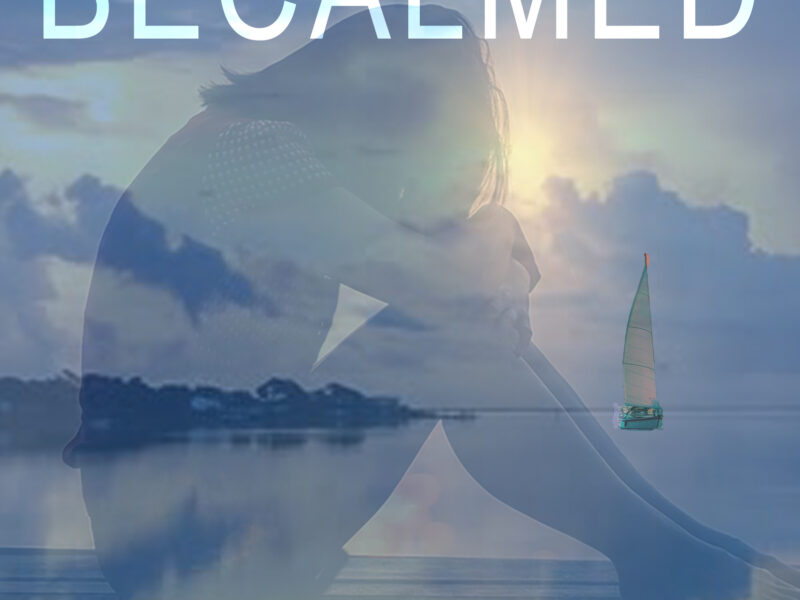Jim Elfers, Marina Manager at Puerto los Cabos (pictures above), suggested we head to Mazatlan for our engine repair—an easy reach, said he, while we’d have a terrible beat up the coast to La Paz with no engine. Okay. When weather predictions from three sources said we’d have 15-20 knots from the NW, slowing by Thursday/Friday, we decided to take off. Jim and a Mexican fellow towed us out on Tuesday at 4PM (waiting for light winds in the marina area so their small boat could maneuver us). We headed out on a close reach, which Jim had predicted, in about 20 knots of wind. No problem.
Except that a couple of hours later as we came out from the protection of the headland, things changed. We shortened sail as the seas mounted (they were supposed to be 1-2 meters. Un-unh. Three meters minimum, off our port quarter and slipping around to our beam when we weren’t looking.) We saw sustained winds in the 30s and gusts in the 40s all night. Hold on Nellie! We decided to heave-to and rest as we realized we’d forgotten to take seasick meds and were not happy campers. Dumb. We’d taken medicine for the first two days after leaving Ensenada, but then hadn’t needed any. I suppose five days in a marina had made our bodies forget and, boy, were they unhappy. We never actually lost food, only felt like it.
I can’t say we got much rest, though, not with those big square waves slapping and pitching us. Fortunately, that night was the last time we saw wind in the 40’s. After that, it stayed between 25-35, so we just used the mizzen and jib. Still, with only two sails, we close reached at 5.5 knots. Sometime during that first day/night, we reread all the grib files and weather predictions just to see if we’d missed something. Nope. They were wrong. We would have happily waited a couple of days if anyone had mentioned big winds. We’d rather have a sail that takes an extra day or two and is comfortable than one that makes you wonder what on earth you’re doing. Frankly, this was as bad if not worse than the trip way off the coast coming down from SF. At least by Thursday morning the winds had begun to drop and by evening the seas were more in the 1-2 meter range.
We were finally enjoying ourselves. We had about 12 hours to go at this rate, so we decided shorten sail again before dark and take it easy.
Fortunately with redundant systems in our pilothouse, the person on watch could check the radar on the computer from a prone position across the way (on our pilothouse settee) and then every hour or so stick a head up to look around outside. Much easier than having to gear up to go outside.
We had hoped for quieter winds and sea, and by Thursday night we got our wish. It was so still that we couldn’t make landfall, nor could we make any headway in the right direction, so we hove to again. Friday morning we set sail with very light winds, knowing we wouldn’t make it to port before dark. So there we sat, enjoying the lovely light breeze, the whales breaching to starboard (and wasn’t that a thrill for me to actually see them nearby as well as through the binoculars!), making water, reading, napping in the sun–in December. A lovely, lovely day, reminding us of why we enjoy cruising and helping us forget the beginning of the trip.
A bird roosted on our bow pulpit Thursday night. (I wish I could find the picture of him. Instead, I’m posting one of the pelican who greeted us at Puerto los Cabos.) He was so cute (I’m sorry, I haven’t yet figured out what kind he was), but Michael didn’t want him leaving calling cards. We tried lights; he didn’t budge. Michael got out his lazer beam, which used to send the sea lions diving for cover, but the bird just ignored it. When M. had to go forward to straighten some lines, he decided to do something to get rid of our nester. He waved his arms; the bird tossed his beak and held on. M. clapped from two feet away. The bird looked M. up and down and tucked his head under his wing. It wasn’t until we gybed that our friend flew off, returning a short while later when things settled down. They’re lovely creatures, but their remnants are very hard to clean off the deck.



